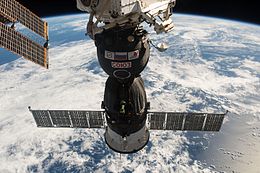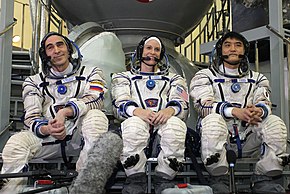 Soyuz MS-01 docked to the ISS. Soyuz MS-01 docked to the ISS. | |
| Mission type | ISS crew transport |
|---|---|
| Operator | Roscosmos |
| COSPAR ID | 2016-044A |
| SATCAT no. | 41639 |
| Mission duration | 115 days 2 hours 22 minutes |
| Spacecraft properties | |
| Spacecraft | Soyuz MS |
| Spacecraft type | Soyuz-MS 11F732A48 |
| Manufacturer | Energia |
| Launch mass | 7080 kg |
| Crew | |
| Crew size | 3 |
| Members | Anatoli Ivanishin Takuya Onishi Kathleen Rubins |
| Callsign | Irkut |
| Start of mission | |
| Launch date | 7 July 2016, 01:36 UTC |
| Rocket | Soyuz-FG |
| Launch site | Baikonur, Site 1/5 |
| Contractor | RKTs Progress |
| End of mission | |
| Landing date | 30 October 2016, 03:58 UTC |
| Landing site | Steppe of Kazakhstan |
| Orbital parameters | |
| Reference system | Geocentric orbit |
| Regime | Low Earth orbit |
| Inclination | 51.66° |
| Docking with ISS | |
| Docking port | Rassvet nadir |
| Docking date | 9 July 2016, 04:12 UTC |
| Undocking date | 30 October 2016 00:35 UTC |
| Time docked | 113 days |
 (l-r) Ivanishin, Rubins and OnishiSoyuz programme (crewed)← Soyuz TMA-20MSoyuz MS-02 → | |
Soyuz MS-01 was a 2016 Soyuz spaceflight to the International Space Station. Originally scheduled for launch in June 2016, the mission successfully lifted off from Kazakhstan on 7 July 2016. It transported three members of the Expedition 48 crew to the International Space Station. Soyuz MS-01 is the 130th flight of a Soyuz spacecraft, and the first with the new version Soyuz MS. The crew consisted of a Russian commander, a Japanese flight engineer, and an American flight engineer.
On 6 June 2016, the launch was rescheduled to July 2016 due to flaws in the control system that could affect the docking to the ISS. The spacecraft was successfully docked on 9 July 2016 and returned to Earth on 30 October 2016.
Crew
| Position | Crew Member | |
|---|---|---|
| Commander | Expedition 48 Second spaceflight | |
| Flight Engineer 1 | Expedition 48 First spaceflight | |
| Flight Engineer 2 | Expedition 48 First spaceflight | |
Backup crew
| Position | Crew Member | |
|---|---|---|
| Commander | ||
| Flight Engineer 1 | ||
| Flight Engineer 2 | ||
References
- "Crew Launches for Two-Day Ride to Station". NASA. 6 July 2016. Retrieved 8 July 2016.
 This article incorporates text from this source, which is in the public domain.
This article incorporates text from this source, which is in the public domain.
- ^ "Soyuz MS crew return". Roscosmos. Archived from the original on 6 May 2017. Retrieved 30 October 2016.
- ^ Garcia, Mark (9 July 2016). "Expedition 48-49 Crew Docks to New Home in Space". blogs.nasa.gov/spacestation.
 This article incorporates text from this source, which is in the public domain.
This article incorporates text from this source, which is in the public domain.
- "Russian Launch Manifest". Retrieved 13 March 2014.
- "First flight of upgraded Russian Soyuz MS spacecraft lifts off for space station". collectSPACE.
- "Launch of new series manned spacecraft rescheduled due to risk of docking disruption". TASS. 6 June 2016. Archived from the original on 9 October 2016. Retrieved 2 June 2016.
- Планируемые полёты. astronaut.ru (in Russian). Retrieved 13 March 2014.
- "Планируемые полёты". astronaut.ru (in Russian). 2015.
| Soyuz programme | |||||||||||||||||||||||||||
|---|---|---|---|---|---|---|---|---|---|---|---|---|---|---|---|---|---|---|---|---|---|---|---|---|---|---|---|
| Main topics |  | ||||||||||||||||||||||||||
| Past missions (by spacecraft type) |
| ||||||||||||||||||||||||||
| Current missions | |||||||||||||||||||||||||||
| Future missions | |||||||||||||||||||||||||||
| Uncrewed missions are designated as Kosmos instead of Soyuz; exceptions are noted "(uncrewed)". The † sign designates failed missions. Italics designates cancelled missions. | |||||||||||||||||||||||||||
| Human spaceflights to the International Space Station | ||
|---|---|---|
| See also: ISS expeditions, Uncrewed ISS flights | ||
| 1998–2004 |
|  |
| 2005–2009 | ||
| 2010–2014 | ||
| 2015–2019 |
| |
| Since 2020 |
| |
| Future | ||
| Individuals | ||
| Vehicles |
| |
| ||
| ← 2015Orbital launches in 20162017 → | |
|---|---|
| January | |
| February | |
| March | |
| April | |
| May | |
| June | |
| July | |
| August | |
| September | |
| October | |
| November |
|
| December |
|
| Launches are separated by dots ( • ), payloads by commas ( , ), multiple names for the same satellite by slashes ( / ). Crewed flights are underlined. Launch failures are marked with the † sign. Payloads deployed from other spacecraft are (enclosed in parentheses). | |